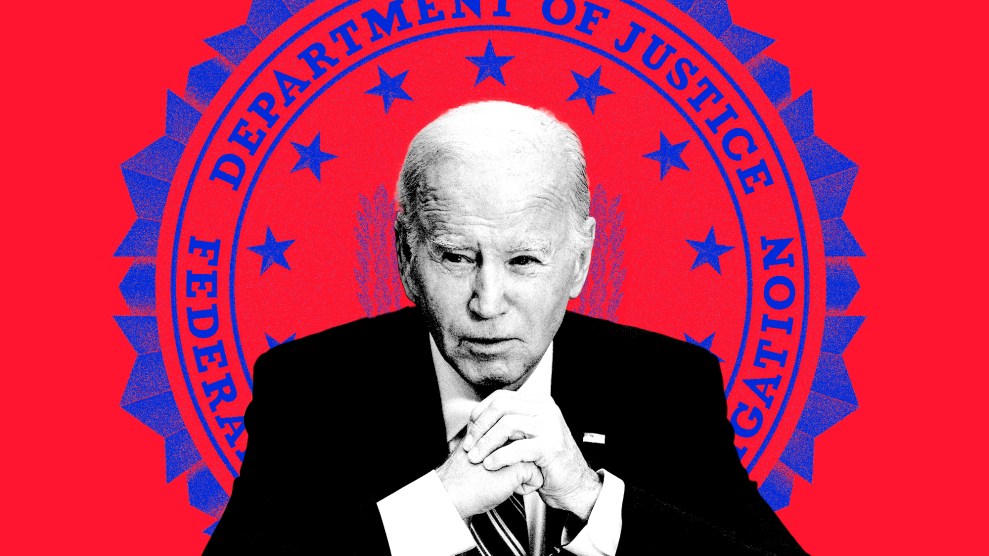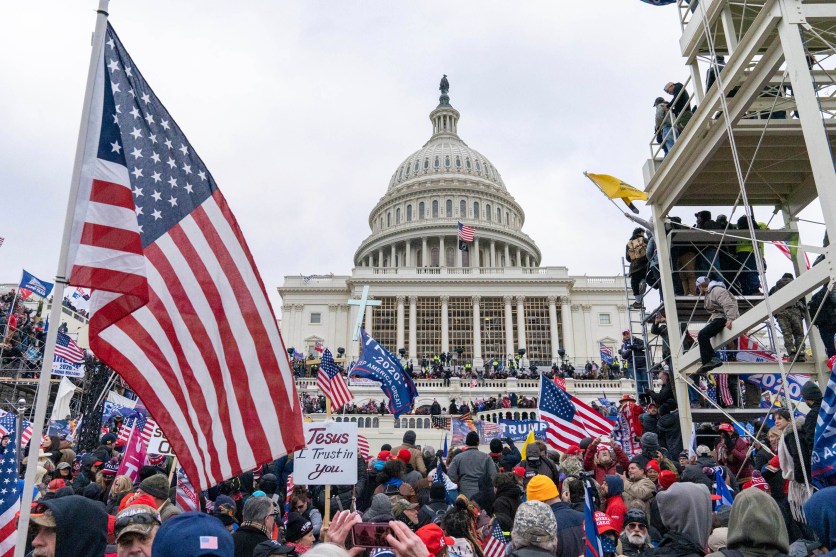
Mother Jones; Evan Vucci/AP
Early one morning in 2015, FBI agents stormed the home of Xiaoxing Xi and arrested him at gunpoint. As his wife and daughters stood in shock, officers handcuffed the Temple University physics professor and jailed him for allegedly leaking confidential technology to China.
The case fell apart four months later, when it turned out that investigators had misunderstood Xi’s emails to his Chinese colleagues. But the experience has scarred Xi, a naturalized citizen born in China, and his family. “We have lived under fears that anything we do could be a reason for the government to charge us,” he said. “That impact will linger for a long, long time.”
The FBI had peered into Xi’s communications in part by relying on Section 702 of the Foreign Intelligence and Surveillance Act, a controversial program that gives the US government vast powers to investigate foreigners abroad—and to spy on Americans in the process. It’s set to expire in December unless Congress renews it, which the Biden administration is pressing lawmakers to do. But that prospect is alarming many advocates for the civil liberties of Asian Americans and Muslims, who say that it allows law enforcement to unjustly target their communities.
Enacted after 9/11, Section 702 of FISA allows federal authorities to tap the phone calls, texts, emails, and other communications of foreigners located outside the US, without first obtaining a warrant. But a loophole also lets them conduct “incidental” surveillance on Americans, sweeping up messages that US residents exchange with targets living abroad. These records end up in a government database—once dubbed the “FBI’s Google” by a Justice Department lawyer—that law enforcement can search, once again without a warrant.
In recent years, the FBI has run many of these “backdoor searches” to spy on people in the US, sometimes without an authorized purpose. For instance, agents have improperly searched the database for people linked to protests following the murder of George Floyd and for two “Middle Eastern” individuals who were reported by a witness after moving boxes of Drano into a car.
“Our concern is that Section 702 can lead to abuses,” says John Yang, head of the advocacy group Asian Americans Advancing Justice – AAJC. “Anytime there is a so-called national security threat, Asian Americans are put under the microscope, whether it’s after 9/11 and the targeting of Arab, Middle Eastern, Muslim and South Asian Americans, or now, where we have increased US-China tensions.”
This fear is echoed in many Muslim communities. “Surveillance has been a long-standing feature of American treatment of Muslim citizens,” says Chris Godshall-Bennett, an attorney with the civil rights group Muslim Advocates. That’s especially true after the Hamas attacks of October 7, he adds, when “we’re witnessing yet another moment of intense anti-Muslim and anti-Palestinian, anti-Arab racism.”
As Section 702’s expiry date looms, the Biden administration is pushing Congress to green-light the program once again. “702 is critical to protecting Americans from foreign terrorist threats,” FBI director Christopher Wray testified in a November 15 hearing before the House Homeland Security Committee. He listed the kinds of threats that it might be used to investigate, including hypothetical cyber attacks from Iran or China, or terrorist plots out of the Middle East. Just weeks earlier, Wray had warned Congress that, amid the Israel-Hamas war, “multiple foreign terrorist organizations have called for attacks against Americans and the West.”
Wray said he was opposed to efforts to add a warrant requirement for pulling Americans’ communications, saying that doing so would hobble the bureau’s ability to act quickly. He also claimed that the FBI was reining in its own searches. According to a recent transparency report, FBI queries of US residents had dropped from nearly 3 million in 2021 to about 119,000 in 2022.
But civil liberties advocates warn that for many communities of color, the stakes are too high to allow federal agencies to police themselves.
The day before Wray’s testimony, 63 Asian American and allied organizations sent a letter to Congress protesting an extension of Section 702 without significant changes. The FBI’s “misuse” of the authority has resulted in “disproportionate targeting” of Asian Americans and their families, the letter said, with “devastating tolls on careers, livelihoods, and reputations.”
From there, advocates say, fear spreads in the community, and a silencing ensues. Concerns about targeting “have a chilling effect on people’s willingness to speak and participate in public life,” argues Godshall-Bennett. “They make people afraid, they isolate people.” He notes that mere government suspicion can be enough to land someone on a no-fly list, keeping them from seeing their families. Even worse, it can lead to situations like that of the Newburgh Four, who served 14 years in prison after FBI agents goaded them into participating in a faux terrorist plot. A judge ultimately ruled that “the real lead conspirator was the United States” and granted the men’s request for release.
The government is more prone to bias when it lacks adequate guardrails on its surveillance power, adds Elizabeth Goitein, a senior director of the Liberty and National Security program at the Brennan Center for Justice. When there’s no need to get a warrant to justify a search, “it becomes far more likely that the government official is going to fall back on conscious or subconscious prejudices, whether racial or ethnic or religious.”
Earlier this month, a group of bipartisan lawmakers introduced the first bill that put Section 702 reform on the table. The Government Surveillance Reform Act, presented by Sen. Ron Wyden (D-Ore), Sen. Mike Lee (R-Utah), Rep. Zoe Lofgren (D-Calif.), and Rep. Warren Davidson (R-Ohio), would reauthorize a version of Section 702 with key changes, like curtailing warrantless searches of Americans’ records. Other proposals, which leave out the warrant requirement, have followed.
These efforts could benefit from an unlikely alliance—one that includes Republicans who’ve slammed the FBI for abusing its authority when it used Section 702 to improperly search for Americans linked to the January 6 attack and when it improperly obtained warrants under a separate FISA provision to snoop on Donald Trump’s campaign adviser. Last week, the Center for Renewing America, a conservative think tank staffed by several ex-Trump administration officials, urged Congress not to renew the authority without a warrant requirement and other restraints that would apply to the entire FISA law, not just Section 702.
For now, the congressional reform push has drawn some support from advocates, who see it as a first step in limiting the harms of unrestrained spying on communities of color. But they add that the problem of profiling and discrimination is far bigger than just law enforcement’s use of Section 702.
“We also continue to need to have a conversation more broadly about the power of the government to surveil us, and its abuse,” says Godshall-Bennett. “That is a conversation that needs to be ongoing.”

















